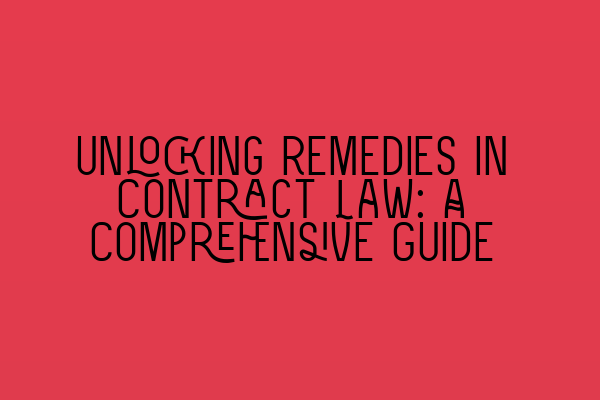Unlocking Remedies in Contract Law: A Comprehensive Guide
In the vast and intricate world of contract law, understanding the available remedies is crucial for both solicitors and clients. Contracts govern countless transactions and agreements, ranging from personal services to complex commercial deals. When disputes arise or obligations are not honored, the remedies available to parties are essential in securing justice and enforcing contractual rights.
This comprehensive guide aims to unlock the realm of remedies in contract law, shedding light on the various legal avenues available to parties in the event of a breach or failure to perform. Whether you’re a seasoned solicitor or just beginning your legal career, this guide will equip you with the knowledge necessary to navigate through the intricate web of contract remedies.
1. Introduction to Contract Law Remedies
Let’s start with an overview of contract law remedies. Remedies can generally be categorized into two types: legal remedies and equitable remedies. Legal remedies typically involve compensatory damages, whereas equitable remedies focus on orders to abstain or perform specific actions. Both types of remedies aim to restore the non-breaching party to their pre-contractual position or provide them with fair compensation.
2. Compensatory Damages
Compensatory damages are the most common form of legal remedy in contract law. When a breach occurs, the non-breaching party is entitled to receive compensatory damages, which aim to put them in the position they would have been in had the contract been fully performed. These damages typically cover both actual (economic) losses and foreseeable consequential damages.
To calculate compensatory damages, several factors are considered, including but not limited to the cost of rectifying the breach, lost profits, and any expenses incurred as a direct result of the breach. Additionally, the concept of “mitigation of damages” plays a vital role, requiring the non-breaching party to take reasonable steps to minimize their losses.
For a deeper understanding of compensatory damages and how they are calculated, we recommend reading our article on SQE 1 Practice Exam Questions to enhance your knowledge in preparation for the SQE 1 exam.
3. Specific Performance
In certain situations, compensatory damages may not be sufficient to address the harm caused by a breach. This is where equitable remedies, such as specific performance, come into play. Specific performance is an order from the court requiring the breaching party to fulfill their obligations as outlined in the contract.
Specific performance is typically granted when the subject matter of the contract is unique or when monetary compensation would not adequately remedy the harm caused by the breach. This remedy is commonly sought in cases involving real estate transactions or agreements for the sale of rare items.
For a deeper understanding of specific performance and its applications, we recommend exploring our article on SQE 1 Practice Mocks FLK1 FLK2 to strengthen your knowledge and gain crucial insight into the complexities of this equitable remedy.
4. Injunctions
An injunction is another powerful equitable remedy that can be sought in contract disputes. Unlike specific performance, an injunction does not require the breaching party to perform a specific act. Instead, it orders them to refrain from doing something, effectively preventing further harm.
Injunctions are commonly used in cases involving breaches of confidentiality agreements, non-compete clauses, or intellectual property rights. They are designed to protect the non-breaching party’s interests and prevent irreparable harm or damage.
For a more in-depth understanding of injunctions and their applications, we recommend delving into our article on SQE 2 Preparation Courses to enhance your knowledge and gain a comprehensive understanding of this powerful equitable remedy.
5. Rescission and Restitution
In certain cases, the non-breaching party may seek to rescind the contract and seek restitution instead of seeking damages. Rescission is a remedy aimed at canceling the contract and returning the parties to their pre-contractual positions, effectively undoing the agreement.
Restitution, on the other hand, seeks to return the non-breaching party to the position they were in before the contract was entered into. This remedy is commonly sought in cases of fraudulent misrepresentation, duress, or undue influence, where the agreement is deemed voidable.
For a detailed exploration of rescission and restitution and their applications in contract law, we recommend diving into our article on SQE 1 Preparation Courses to expand your knowledge and gain a comprehensive understanding of these remedies.
6. Conclusion
As the saying goes, “knowledge is power,” and in contract law, understanding the available remedies is paramount. This comprehensive guide has unraveled the intricacies of remedies in contract law, shedding light on compensatory damages, specific performance, injunctions, rescission, and restitution.
By familiarizing yourself with these remedies, you will be better equipped to provide expert advice to clients and effectively advocate for their rights and interests. Additionally, your understanding of remedies will serve you well in the journey towards becoming an exceptional solicitor.
For more information on contract law and other aspects of the SQE exam, we recommend exploring our website for a wealth of educational resources, including articles, courses, and SRA SQE Exam Dates.
Remember, the key to success lies in continuous learning and staying updated with the latest developments in contract law. So, seize this opportunity to expand your knowledge, and embark on a journey to unlock the world of remedies in contract law.
